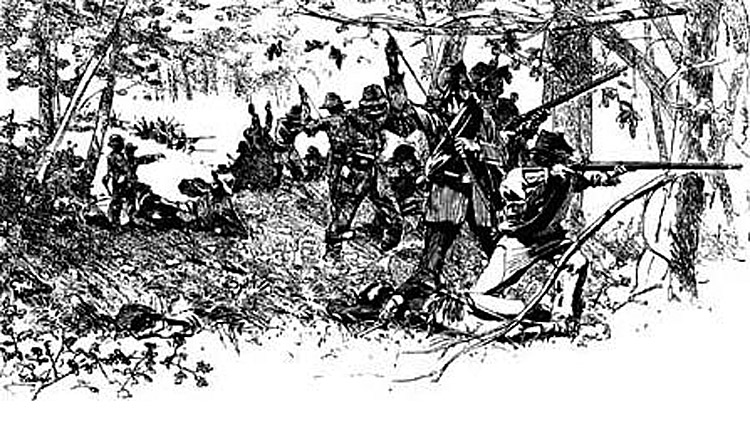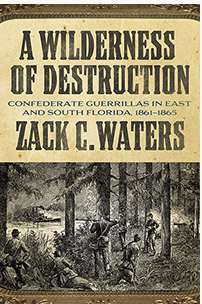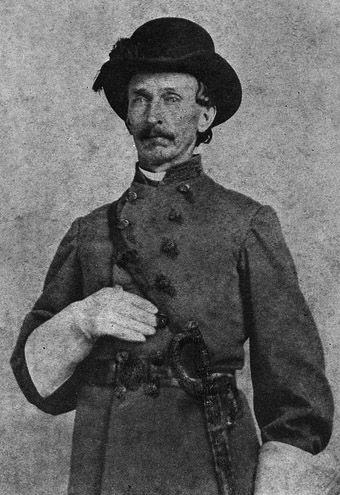
- Articles
Book Review—A Wilderness of Destruction: Confederate Guerillas in East and South Florida, 1861-1865 by Zack C. Waters. Reviewed by Robert A. Waters
(Today’s Florida is a tourist mecca, a gathering place for northerners fleeing sub-zero temperatures, a retiree’s paradise, and a haven for the wealthy who wish to flee high-tax states. It was nothing like that in 1861. Florida, with a population of 140,000, had far fewer residents than any of the other states that seceded from the Union. Many of its citizens hailed from southern states, particularly South Carolina, Alabama, and Georgia. A scattering of Yankees had moved to the “Land of Flowers,” and others came from Cuba and Spain, as well as several European countries. 60,000 enslaved persons made up the mix, and, in the Everglades, licking their wounds, were remnants of the Seminole Indian tribes. On January 10, 1861, Florida became the third state to tear away from what its citizens believed was a tyrannical United States government.)

Award-winning author Zack C. Waters has once again delved into uncharted territory in historical research. His new book, A Wilderness of Destruction, is a fast-paced telling of how Confederate Floridians fought a long-term guerilla war against northern invaders. Because of this resistance, the Union could never control the interior of the state. Tallahassee was the only Confederate capitol to never be captured. Waters has discovered many little-known, or in some cases, previously unknown skirmishes, that occurred between Union invaders and Confederate sympathizers.
Almost immediately after the war started, the Union began an assault on Florida’s coastal cities. Since Florida had no manufacturing industry, except for the making of salt, Northern military strategists reasoned that St. Augustine, Jacksonville, Tampa, Key West, Pensacola, and Cedar Key would quickly become a pipeline for goods flowing from Europe into the Confederacy. Within the first year, Union armies occupied all those cities. Yankee ships endeavored, with some success, to stop the flow of gunrunners and smugglers. As the war progressed, it became harder for Southern partisans to sneak through the armada of ships lined up along the coasts.

Throughout the war, Union soldiers attempted to occupy inland Florida. Raiders such as Confederate Captain J. J. Dickison, with the help of Rebel supporters, made life miserable for the Yanks. In the Battle of Horse Landing, for instance, three Cuban sisters warned him of a planned attack on his camp. In the dead of night, Dickison moved his troops to a more strategic location and destroyed the attackers, with no loss of his own men. Throughout the war, Southern civilians provided information to guerillas, helping to keep the Union armies bottled up in the coastal cities.
As the war progressed and the tide turned in favor of the northern invaders, it became more difficult to keep the Rebel armies fed. Once Vicksburg fell, the conduit of Texas beef to the Confederacy ended. Confederate General Braxton Bragg, leader of the Army of Tennessee, wrote to Florida leaders: “We are now dependent on your state for beef. The future of the army depends on how well it is fed, and this in turn depends upon our ability to secure food from Florida.” Unfortunately, there was no railroad from Florida to Georgia, so the armies of Lee and Bragg would be dependent on old-fashioned cattle drives for their sustenance.
Waters writes that “the huge herds of half-wild cattle that roamed the prairies of South Florida came from the Andalusian cattle brought to the New World by Spanish conquistadors, settlers and monks. By 1860, estimates of the size of the herds in the southernmost state numbered at 658,609…” Jacob Summerlin, a die-hard Confederate, was one of several ranchers in Florida to be tasked with getting the beef to Georgia. There the Southern government would move the cattle by train to the theaters of war. Waters writes: “The task of maintaining an avenue to drive the cattle to the Confederate supply centers would become a job for the guerilla companies of Florida.”
The actual driving of the cattle was a difficult endeavor. “The cowmen,” Waters writes, “had to traverse a wilderness region inhabited by bears, panthers, wolves, Unionists, deserters and other predators.” Even as General William Sherman was burning Georgia to desolation, the Florida cowboys continued to find ways to get the coveted beef to Confederate armies.
In the spring of 1865, as the Confederate States of America surrendered, members of the Confederate cabinet faced a conundrum. If captured by Union troops, they might be summarily hanged. Jefferson Davis was captured in Georgia. Others were captured or gave themselves up. None were hanged, although Davis faced that prospect for several years.
As northern newspapers howled for the blood of Confederate “traitors,” Judah P. Benjamin, former Secretary of State, devised a plan to outwit his pursuers. His scheme depended on former Florida guerillas leading him to freedom. By disguising himself as various tradesmen, and sometimes as a French traveler, he eventually made it to the Bahamas. From there, he traveled to England where he became a respected barrister. For many years, he kept in touch with the men and women of Florida who assisted him.
Confederate Vice President John C. Breckinridge was the most wanted of all. Even the Union general who burned Atlanta advised him to make a run for it. “General Sherman—at a meeting with Confederate officers following their capitulation—advised Breckinridge to flee, explaining that the people of the Northern states felt especially bitter toward the former U. S. Vice President who took up arms against the government.”
Once again, Captain Dickison took charge. He advised Breckenridge to flee to Cuba. Waters writes that, “Breckinridge’s party began their escape from the United States on the west bank of the St. John’s River, near Palatka. They traveled up the waterway, constantly beset by swarms of gnats, mosquitoes, and a scorching sun…” Eventually, they landed in Cuba. Breckinridge traveled to Europe and the Holy Land before settling in Canada. Had he been captured he almost certainly would have been executed.
During the 1960s, Zack C. Waters learned his writing skills from some of the finest Southern authors at the University of Florida. Over the years, he has written dozens of articles about his favorite subject, the Civil War. A Wilderness of Destruction is his third book about that war that changed history. The book is also a goldmine for genealogists. If you, like me, are interested in learning more about your Florida ancestors, buy this book. I highly recommend it.
Reviewed by Robert A. Waters
Robert A. Waters is the author of the national best-seller The Best Defense: True Stories of Intended Victims Who Defended Themselves With A Firearm (1998) as well as five true crime books, including Guns Save Lives (2002) and Guns and Self-Defense (2019). Visit his popular blog, Kidnapping, Murder and Mayhem, on the internet at www.RobertWaters.net.
This article may be cited as: Waters, RA. Book Review—A Wilderness of Destruction: Confederate Guerillas in East and South Florida, 1861-1865 by Zack C. Waters. Reviewed by Robert A. Waters. HaciendaPublishing.com, May 7, 2023. Available from: https://haciendapublishing.com/book-reviewa-wilderness-of-destruction-confederate-guerillas-in-east-and-south-florida-1861-1865-by-zack-c-waters-reviewed-by-robert-a-waters/.
Copyright ©2023 Robert A. Waters
1 thought on “Book Review—A Wilderness of Destruction: Confederate Guerillas in East and South Florida, 1861-1865 by Zack C. Waters. Reviewed by Robert A. Waters”
This a very good review and Zack Waters is not only an excellent writer and researcher but a true Southerner. I have always had a love of the history of the old South, its values and its love of country. We all know, or should know, that very few Southerners owned slaves and those that did brought them from yankees who led the slave trade in the United States. That is another story. The idea of the book is resistance based on a love of country and region. General Robert E. Lee, sought after by the yankee command, stated that he wanted to defend his region against attack and invasion. At a reunion, having seen reconstruction, he stated to a confidant ” If I knew it would have led to this I would have never surrendered.” An excellent book has been written on the subject. Further, it has been proved by careful research that the yankee States controlled the slave trade in the United States. This is another great book by Zack C. Waters which should be a source of pride for Floridians..